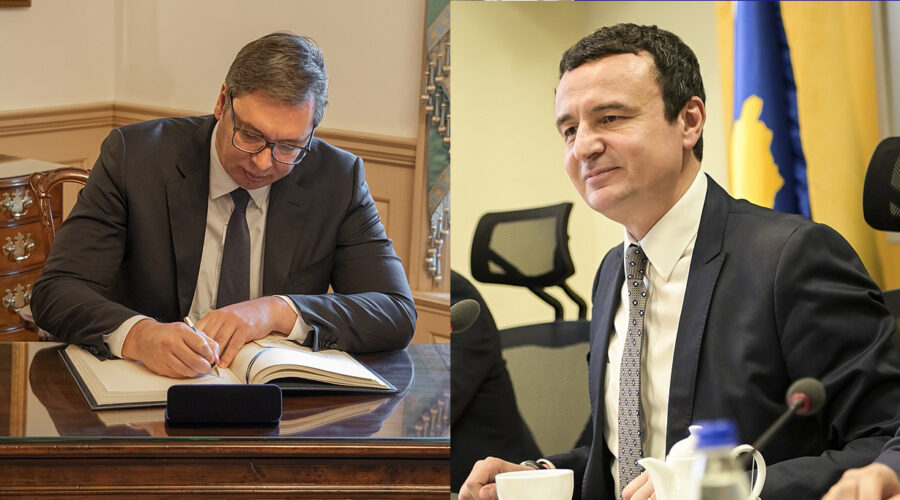Tensions are growing in northern Kosovo a day after Serbian President Aleksandar Vucic and Kosovo’s Prime Minister Albin Kurti failed to reach a deal on the license plates dispute. The two leaders met in Brussels on November 21, allegedly in an attempt to de-escalate the situation in the region where ethnic Serbs make up a majority of the population and refuse to integrate into the Albanian-dominated self-proclaimed Republic of Kosovo.
“The Serbian armed forces are ready to take all measures to protect the Serbs in Kosovo and Metohija”, Serbian Defense Minister Milos Vucevic said following the meeting in Brussels, pointing out that the atmosphere in northern Kosovo is tense, and could easily escalate.
That, however, does not mean that a full-scale conflict in the Balkans will break out any time soon, if at all. As a result of the 1999 war, thousands of NATO troops have been deployed to Kosovo. The United States-led Alliance would unlikely allow Serbian troops to intervene in what Belgrade sees as its southern province. The US, as well as 22 out of 27 members of the European Union, have recognized Kosovo’s 2008 unilaterally declared independence, which means that the West would see a potential Serbian intervention as an act of aggression.
Serbia, a military neutral country surrounded by NATO members, is quite aware that it cannot count on anyone’s support in case the situation in northern Kosovo escalates. However, Belgrade is unlikely to abandon the locals Serbs if the Albanian-dominated Kosovo police start enforcing the planned fines to drivers who have cars with Serbian-issued license plates.
Reports suggest that only 20 cars belonging to Serbs from northern Kosovo were re-registered with RKS (Republic of Kosovo) plates. The Serbs seem determined not to integrate into the Albanian-dominated legal system, since they see Kosovo as part of Serbia. That is why the vast majority of them refuse to replace their Serbian-issued license plates and identification cards with Kosovan documents.
In protest over a row on vehicle number plates, they have recently withdrawn from all central and local institutions in Kosovo. As a result, there is practically no local police in northern Kosovo, which means that the authorities in Pristina may have to deploy special police units to start confiscating vehicles with Serbian-issued license plates. Such a move will almost certainly force the Serbs, backed by Belgrade, to build barricades near the administrative boundary line with Serbia. After that, the ball will be in Kurti’s court.
“Certainly, it won’t be easy in the coming period,” Vucic stressed following the failed talks in Brussels, adding that “tough days and sleepless nights await us.”
Kurti, on the other hand, said that he did not accept the EU’s proposal on license plates because the European Union foreign policy chief Josep Borrell “gave up on efforts to reach an agreement with Serbia on normalization of relations by March 2023.”
Borrell, for his part, warned that any escalation and violence that might occur on the ground in the following days.
“For the sake of transparency, I have to say that we put forward a proposal that would avoid this situation. Vucic accepted it, Kurti did not”, Borell emphasized, pointing out that Pristina failed to respect its international legal obligations.
It is probably the first time that the EU openly criticized Kosovo. But if the situation eventually escalates, Western media are expected to blame the Serbs – who have been heavily demonized in the 1990s – and the EU officials are unlikely to side with Belgrade. Sooner or later, the United States, rather than the European Union, will have to intervene and force both sides to reach a deal. The very fact that Kurti, following the request from the US Embassy in Pristina, decided to postpone the decision to fine drivers with Serbian-issued license plates, perfectly suggests that Washington still pulls the strings in Kosovo. But given that the US firmly supports the self-proclaimed republic, it is Belgrade, rather than Pristina, that will have to make serious concessions in order to end the license plates dispute. In the mid-term, Serbia will likely have to stop issuing license plates to the Serbs living in northern Kosovo, which will force them to start using Kosovo-issued RKS plates.
Once the burning issue is resolved, the US is expected to pressure the Serbian government to fully normalize relations with Kosovo – a territory that Belgrade sees as an integral part of Serbia. Recently, France and Germany have made a proposal for a deal on Kosovo’s final status. The draft reportedly suggested UN membership for Kosovo, without opposition from Serbia, as well as the exchange of permanent missions, similar to embassies but at a lower level. In other words, Serbia would have to implicitly recognize secession of its own territory.
From Belgrade’s perspective, under the current geopolitical circumstances, some sort of partition of Kosovo would be the least-worst option. But from the US perspective, such an outcome would mean that Washington has demonstrated weakness, and has made concessions to Serbia – a country America bombed in 1999 and forced to withdraw its troops from Kosovo. Therefore, even though both Brussels and Washington might not be satisfied with Kurti’s political attitudes, they are unlikely to ever support Belgrade against Pristina.
Finally, given that the entire region is deeply in the Western geopolitical orbit, it is not very probable that the US and the EU would allow a serious destabilization of the Balkans. In the short-term, local low-scale clashes in northern Kosovo are entirely possible, though.
Images: U.S. Department of State and Office of the Prime Minister of the Republic of Kosovo

